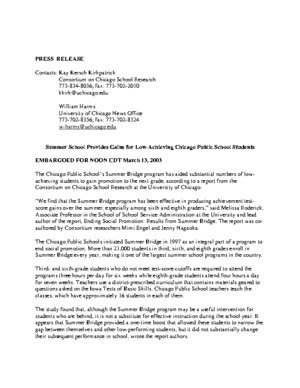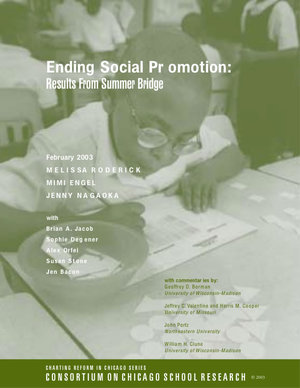1. To what extent is Summer Bridge effective in increasing students' test scores and allowing more students to be promoted? And, how do the short-term effects of the program vary by whether students have very low skills or are closer to the test scores required for promotion?
2. To what extent is there evidence that large-scale mandatory summer programs can produce uniform effects across students and schools?
3. To what extent do summer programs like Summer Bridge provide positive learning environments for students?
4. How did staffing characteristics, teachers' implementation of the curriculum, and classroom learning environments shape the program's impacts?
5. Can a summer program provide help for low-achieving students that is sustained over time?
In the 1996-97 school year, the Chicago Public Schools (CPS) began a national trend when it included a required summer program, Summer Bridge, as a central component of its efforts to end social promotion. Over 21,000 students in the third, sixth, and eighth, or promotional gate grades, have attended Summer Bridge each year, making it one of the largest and most sustained summer school programs in the country.
This report presents a rigorous and careful evaluation of Chicago’s Summer Bridge program. It is designed to address the following central questions that arise in the use of summer programs to support low-achieving students under high-stakes testing:
- To what extent is Summer Bridge effective in increasing students' test scores and allowing more students to be promoted? And, how do the short-term effects of the program vary by whether students have very low skills or are closer to the test scores required for promotion?
- To what extent is there evidence that large-scale mandatory summer programs can produce uniform effects across students and schools? To what extent do summer programs like Summer Bridge provide positive learning environments for students?
- How did staffing characteristics, teachers' implementation of the curriculum, and classroom learning environments shape the program's impacts?
- Can a summer program provide help for low-achieving students that is sustained over time?
Over the last four years, a team of researchers at the UChicago Consortium has assembled a diverse data set to examine these questions. We analyzed the achievement of all students in Summer Bridge, surveyed and interviewed participating teachers and students about their experiences, and conducted in-depth classroom observations in 12 schools. This report brings together this qualitative and quantitative research to take a multifaceted look at Summer Bridge from its inception through the summer of 2000.



